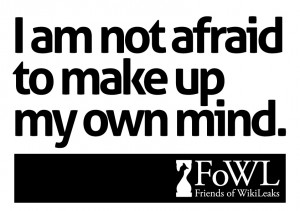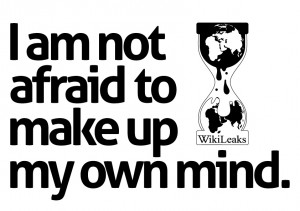URGENT before reading the rest of this post, you need to know that
Prime Minister David Cameron can override the UK Supreme Court Decision to extradite Julian Assange. It is within the Governments power to assert parliamentary sovereignty in this case. We have 7 days before the beginning of the extradition period and must focus efforts on sending this letter to our Prime Minister.
This is a crucial last stand against the extradition of Julian to Sweden and we have an amended template letter for you to use. Click this link and print (or copy) the two letters.
Send the first, by post, to: David Cameron, Prime Minister 10 Downing Street, London, SW1A 2AA.
The second letter is a ‘cc’ to The Queen. While she has no direct role in parliament she is in weekly contact with our Prime Minister and has a ‘duty to warn’ about relevant concerns. We need to have this issue on the agenda when they meet. Send this letter (including the cc copy) to: Her Majesty The Queen, Buckingham Palace, London SW1A 1AA
Pledge to make the next seven days count- send your letter as soon as possible. Forward the letter on to everyone you know who cares about the integrity of our legal system and urge them to send the letter immediately. Forward on the letter to local community groups, the local paper, anywhere it might be picked up by someone. Tweet it, put it on your blog or facebook account. Print hard copies of it and leave them at your local CAB or community centres, Universities or work places. If you are attending any demonstrations or public meetings, take hard copies along with you and distribute them (with addressed envelopes if possible). Make it as simple as possible for people to send this letter to our Prime Minister.
Read on for more about what you can do, BUT do not forget the letter- our Government has the power to halt the extradition of Julian Assange.
On the 14th June the UK Supreme Court declared their decision to reject Julian Assange’s appeal and to extradite him to Sweden despite there being no charge against him.
Julian will be extradited between the June 29th and July 8th. When he reaches Sweden he will be detained (no bail) without any means of contact with the outside world apart from via his lawyer. Remember the context: Julian Assange has been held under house arrest for 557 days (despite there being no charge against him) amidst continued political and media attacks on his work within WikiLeaks. Importantly, Julian Assange spent 5 weeks in Sweden following the complaints made against him and offered himself for questioning. He has also offered to speak with officials regarding the case from where he is now situated in the UK. Despite this, the Judicial Authority of Sweden has declined any opportunity to make reasonable contact with Mr Assange. Denying this has led to an unreasonable delay in the resolution of the case- a delay where the agitation against Julian (and sustained misreporting in the media) would make it impossible for any court to remain unbiased.
There is room to read this case as one where the original concerns of the two complainants involved have been hijacked for the purposes of a more elaborate case against Julian Assange. If the rights of the women who have made the allegations had been at the fore, then every effort should have been made to question Julian Assange when he presented himself for these purposes while still in Sweden. The consequences of not doing so, whether intended or not, has allowed room for political stakeholders in the extradition of Julian Assange to Sweden. In this we risk undermining the processes in place to uphold the rights of women to ownership of their own bodies. Disturbingly one of the complainants describes feeling railroaded and did not sign her statement. The possibility that the experiences of the women involved are being hijacked and used as a political tool is serious. It corrupts the processes in place that are designed to protect women and, absurdly, victimizes them. The dichotomy presented in the media (see this article for example) in which one either stands in support for Julian Assange or stands in solidarity with women is a false one. The timeline of events in this case has served in nobodies best interests other than those who have declared openly that they want Julian Assange out of the picture. Remember Sarah Palin’s words:
“Julian Assange should be targeted like the Taliban ”
Former US Vice Presidential Candidate- see other quotes here
It is the UK Supreme Court that has allowed this process to culminate in the extradition of Julian to Sweden. At best this shows the rule of ‘innocent until proven guilty’ to be a myth, at worst this is an indication of how vulnerable legal processes are in the UK to the corruption of political manoeuvrings. This could be any of us who dare to stand up against the status quo in our demands for a more just society.
What we will do
1. We will arm ourselves with the facts:
Make sure you acquaint yourself with the facts in order to be in a better position to make up your own mind. There are some wonderfully accessible sites already documenting the case against Julian Assange:
http://justice4assange.com/
wlcentral.org/node/1418
http://www.support-julian-assange.com/
Join in the discussion with others too, this will help you formulate your own ideas and thoughts about why this case is important:
http://www.wikileaks-forum.com/index.php
WikiLeaks chat
2.We will disseminate the facts:
This requires you to be vigilant on two counts:
a) correct inaccuracies, misreporting, slander and ill-formed arguments.
Actively look out for anything reported publicly that you think is wrong or needs to be challenged and make a stand. Write, post, comment, call and flag up the inaccurate reporting to others. Make use of your MP and write to them telling them why this is important to you and asking them to make a stand on your behalf. You can find some ideas, templates and tools here.
Do as much as you can in the public eye- re-publish your letters and responses on the forum for example and keep your dissent public- it helps all of us to position our thoughts and inspires others to make a stand themselves. See this letter of complaint to Nick Clegg regarding the outrageous comments of Bridget Fox while she was representing the Liberal Democrat Party as an example.
Make a note of some of the facts of the Julian Assange case and spread them far and wide. Tweet them, put posters up, text your friends every week with a new fact- there are many ways in which you can uphold the integrity of truth, be as inventive as possible. Take a photo of whatever you are doing where possible and tweet it, send it to us here, via email or at our facebook page (see here for ways to contact us) and share your creativity.
b) see media and political silence as the suppression of truth
It is striking that the UK mainstream media has been relatively silent regarding the case against Julian Assange until the Supreme Court made it’s decision to uphold the European Arrest Warrant. It is also noted that the ‘World Tomorrow‘ episodes, despite the integrity and importance of these interviews, has received very little press attention. Under-reporting and the refusal of the media to follow the importance of this case in terms of its wider implications is as dangerous as the propagation of disinformation. We need to be seen to be watching and taking interest- if there is continued and informed public interest our very presence will go some way to keeping political agitation in check. Write to your local political parties and ask them to offer a statement describing their position on WikiLeaks and the Assange case.
Write in to the letter pages of national and local papers. Encourage other people you know to do the same and make it easier for them by providing the contact details you have used and your own letter which can be used as a template.
Print off the posters and graphics circulating online (or make your own) and put them up around your local area/uni/community centre/citizens advice centre- anywhere they will be seen. Take a photo of your poster and send it in/tweet it in reply to @UKFoWL and inspire others to do the same. You can find graphics here, here and at the outrageously amazing SomersetBean blog. Email Somersetbean or contact him on twitter (@somersetbean) if you want help with your own poster/flyer designs.
Consider hosting a ‘WikiLeaks’ forum or discussion in your local area. This can be as informal as having a themed night out (or in!) with some friends talking about WikiLeaks and the issues around the Assange case, or step it up a bit and organise a community event in a local community centre, uni or pub. Choose a WikiLeaks related theme that you are most interested in (such as impact of the cable releases, the role of the surveilance state, the world tomorrow episodes, extradition law etc) and make some inquiries about local speakers. If you feel a bit daunted in organizing this from scratch do an on-line search for groups that are already meeting in your local area and suggest they take on your chosen theme. If you have a local ‘skeptics in the pub’ group for example make contact with them (you can find a list here). Similarly ‘truthjuice’ groups may be a good place to start- find their groups here or contact them for advice on running your own. Advertise your discussion on twitter, facebook or the forum (which will inspire others to do the same) and, if appropriate, take a video recording (or make minutes if you do not have a video camera) which can be used to document the event and share with others.
Join in with the ‘Global Friends of WikiLeaks’ visibility campaign (described more here) and send in your photos to: globalfriendsofwikileaks@gmail.com. FoWL look better in the collective.
3. We recognise ourselves as activists:
Think about what skills you possess and put them to good use. If you are into your tech for example offer to help out on a WikiLeaks supporter website, develop your own blog, or help others in your area who are timid of the internet to go through the WikiLeaks website. If writing is your thing get in touch with us at UKFoWL (UKFOWL@riseup.net) and become an author here, on your own blog or apply to be a WLcentral reporter. Go along to local demo’s and protest meetings that are related (such as internet freedom, human rights) and take some flyers about WikiLeaks to hand out. In speaking out, standing up and sharing your thoughts with others you become an activist- simple as that.
4. We acknowledge our political agency:
We need to acknowledge that our activities within the political structures of our country is a vital component to our demand of a fair and just society. Democracy cannot be ever fully realized as it stands in constant tension with the structures and frameworks our society sits within and, as such, must be consistently fought for and critiqued. If we can see something is wrong, we have a rational duty to change it. When we are not afforded a clear view of what is going on or where we find our political agency suppressed we need to dissent. Resistance cannot be efficient unless we understand actively where control is being exerted. Avoid feeling too despondent or cynical about the political processes in the UK- if you feel there is something wrong, demand change. This can be in the form of a letter to your MP or in the process of you deciding to stand as a candidate in your local elections. The first place to start though is having your own political opinion. In recognising our place in the wider world and seeing that we are connected to events happening all over the globe, we see ourselves as more than just one individual. We are part of a chapter in history and we should be free to decide the role we play.
5. What we are doing as UKFoWL:
UKFoWL are currently organising two events:
i) we are supporting the ‘Halt the Extraditions’ demo in London on June 23rd. You can find out more here, you can join in preparations for the event here and download demo materials here.
ii) we are organising a rally in support of Julian Assange for July 1st- this will be in conjunction global actions taking place on the same day. We will be issuing more details soon but, for the time being join in the discussions here. Get in touch via email (UKFOWL@risup.net) if you want to be involved further.
If you are not London based, think about organising a local event in support and get in touch so we can advertise your event. Feel free to use any of our demo kit and amend with your own details.
Also get in touch if you have some ideas about related protests, demos or actions that you think FoWL should be present at. Download some of our FoWL flyers and hand them out whenever you can.
Share any ideas about what UKFoWL could be doing (or doing better) and let us know if you want to be more involved. We are stronger together. If you have not done so already become part of the Friends of WikiLeaks collective by joining up at wlfriends.org and check here for ways you can donate money to support Julian Assange as he fights for our freedom.






